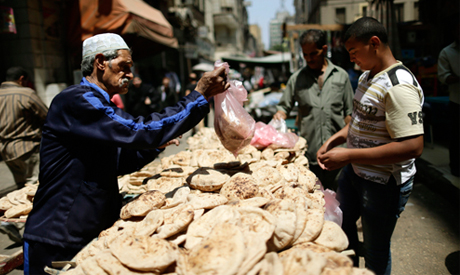
Egyptian buy bread at a popular market in Cairo, Egypt (Photo: Reuters)
Egypt's urban consumer inflation jumped in April after easing since the end of last year, the statistics agency said on Tuesday, putting pressure on the government to raise subsidies with Ramadan approaching in June.
Food demand normally spikes during the Muslim holy month because of heavy consumption following the dawn to dusk fasting period. Ramadan this year begins on June 6.
President Abdel Fattah al-Sisi is under increasing pressure to revive the economy and keep prices under control to avoid any backlash from the public whose mantras in the 2011 revolution included "bread, freedom and social justice".
Army trucks have distributed cheap food and Sisi has promised to protect the poorest in a society where tens of millions rely on subsidies.
Urban consumer inflation rose to 10.3 percent in April from 9 percent in March, data from the CAPMAS statistics agency showed, the first time since November that inflation has risen.
Core inflation, which excludes items such as fruit and vegetables as their prices fluctuate widely, also jumped in April to 9.51 percent from 8.41 percent in March, the central bank said on Tuesday.
The government said in November that it would control prices of 10 essential commodities to help restrain inflation with the country short of foreign hard currency, and price movements subsequently eased.
But inflationary pressure resurged when the central bank devalued the pound in March by about 13 percent in order to close the gap between official and black-market rates for the U.S. dollar.
The bank later hiked interest rates by 150 basis points at its monetary policy committee (MPC) meeting on March 17 to curb expected inflationary pressures.
"There is some impact from the devaluation in March with continued pressure on prices, as well as unfavorable base effects which led to the rise in inflation," EFG Hermes economist, Mohamed Abu Basha, said.
"Businesses generally are likely to gradually increase their prices to maintain their margins after the devaluation," he said. Abu Basha expects inflation to stabilise about 10 percent next month.
Egypt has been struggling to revive its economy since a 2011 uprising drove away tourists and foreign investors who are major sources of hard currency, eroding its foreign reserves.
Reserves diminished by more than half to $17 billion in April and the central bank has been rationing its dollars, focusing on imports of essential goods. A black market for dollars has seen the pound weaken to about 11 a dollar, far from the central bank's official rate of 8.78.
Abu Basha said the weakness of the pound on the black market was another factor in the surge in inflation. The dollar sold at a range of 10.85-10.95 pounds on the black market on Tuesday, two traders said without giving trade volumes.
At its last MPC meeting on April 28, the central bank kept benchmark interest rates unchanged, balancing inflationary pressures with the need to stimulate the economy. Its next meeting is on June 16.
Short link: